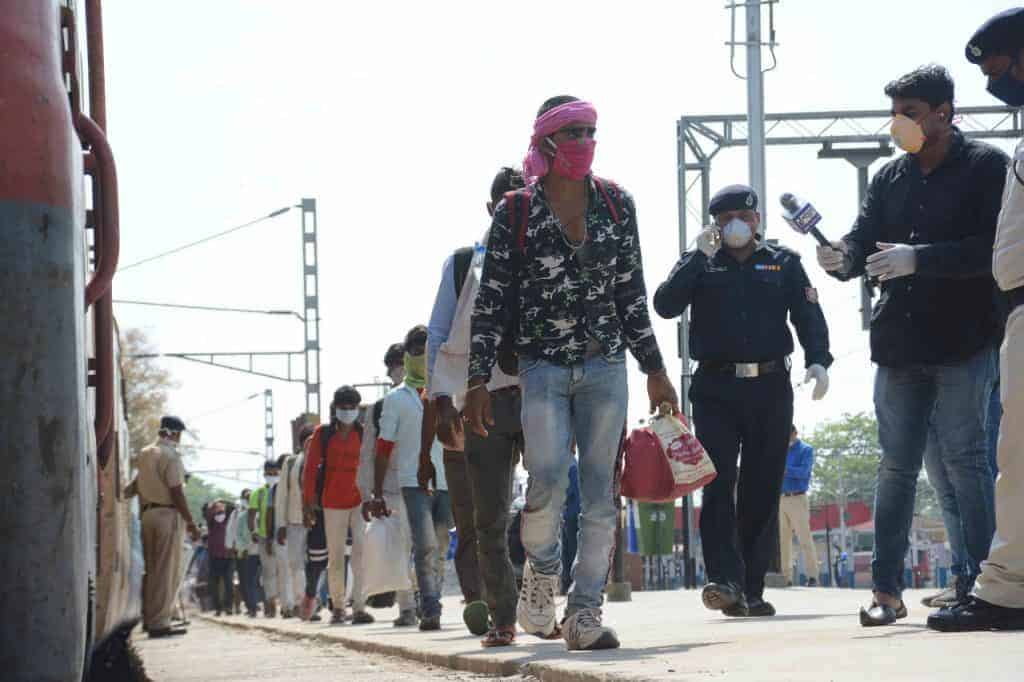Guarantee: An assurance for the fulfillment of a condition (Merriam Webster Dictionary) A trite and tired cliché, but so true. There are no guarantees in life. A truth brought home starkly and tragically to millions of urban workers, as the country shut down overnight in March 2020 to battle the COVID pandemic. And again earlier this year, as the second wave hit. And now, fearful of another lockdown as wave three of the virus threatens to strike, workers are again wondering if they will be left without any jobs.
But the bigger tragedy is that those stark images of migrant urban workers walking back to their home villages from one end of the country to the other are probably long forgotten. With the workers themselves, who are trickling back to the cities hoping to regain the jobs they had lost, remaining as anonymous as ever.

Unnoticed then, unnoticed now. Doing whatever jobs, at whatever salary, they are able to get. Sitting in groups in the same corners of different cities from where contractors once picked them up.
But there are no old or new jobs available. No matter what their skill, or lack of. With production cutbacks by large and small industries all over the country, businesses are freezing hiring and wages. Leaving desperate urban workers open to exploitation. Or forced to scratch a living, selling vegetables or whatever.
Read more: Migrant workers back in cities, but where are the jobs?
There are no livelihood guarantees for them for the present or the future. These are desperate times for these workers, and “desperate times call for extraordinary measures,” said Somnath Mukherjee, an investment strategist and Managing Partner at ASK Wealth Advisors.
One such urgent desperate measure is creation of some kind of National Urban Employment Programme.
Other economists call it by different names. The only common point of reference being that the time is now for the states and centre to get together to formulate such a programme. We agree. But there ends all unanimity as the idea runs into the different stumbling blocks of practicality, implementation and cost.
However, there are a few points on which many experts agree.
Start small
Start small, they all say. Sensible advice. The most important, not to use the word ‘guarantee’ anywhere in formulating such a scheme. To instead call it something innocuous like an ‘Urban Work Programme’.
The rural scheme guarantees a minimum of 150 days of work a year. A scheme for urban jobs, to start with, need not match this. Some economists suggest starting with just 50 days a year. Something is certainly better than nothing. And making a start is better than waiting to iron out all possible contingencies. What is urgently needed from policy makers is a sense of urgency to launch such a pilot programme for urban workers in a small city and learning from it to replicate it elsewhere.
Involve the local government
It has to be a bottom-up exercise, starting at the city ward or councillor level. Not top down, under any circumstances. The city wards decide the work and the beneficiaries. As IIM professor Ankur Sarin wrote in a guest column for CM: “One set of key actors that need to be called for this task are Ward Councillors. As local elected representatives, they are embedded in the community and informed about both demand and supply opportunities”.
Will local politicians support such a scheme in their constituencies? Not one has said so beyond giving lip service about the need for this. Obviously there is nothing in this for them. Maybe not even votes. Therein is the key. Making such a scheme an important poll campaign issue among all grassroots urban workers.
Read more: Guest column: A councillor-driven urban jobs initiative could save the day
Start with the PDS database
But methodology on how to compile data on beneficiaries finds no consensus. One runs into potentially divisive issues like locals versus outsiders to name just one. It is not insurmountable, however. A starting point is the database, already available in cities, of people holding Below Poverty Line (BPL) ration cards. Building on this list, making it more robust, secure and easy to use is a solvable technical problem, if politics can be left out of it.
Do not try to reinvent the wheel
Learn from others who have tried this out, like Bhubaneswar, with Odisha being among the first states to try out such a scheme for urban workers post unlock. Unfortunately, no attempt was made to properly document the working of this scheme and applying the learnings from it elsewhere.
There is plenty of learning available however, from Bhubaneshwar, Kerala and one or two other states who have tried such a scheme at a small scale. It just needs to be collated, studied and applied suitably depending on local needs.
Read more: Urban job guarantee programme critical to strengthen small and medium towns
What kind of work will such a scheme undertake? There is no shortage of work, say its proponents. Like Jean Dreze, visiting professor of economics at Ranchi University and one credited with having had an important role in the concept and drafting of MNREGA. Says Dreze: “This is an excellent time for an urban employment drive. There are vast possibilities of productive work in fields like public health, environmental improvement, and perhaps even home care”.

Fix cost-sharing
Lastly, cost. How will this be shared between the centre and states. What is obvious is that such a scheme can in no way pay the legally mandated urban daily wage. But it will have to match the mandated rural wage at least. Given the poor state of finances of all cities, can even this be managed? It can, say economists. The trick is to make it worth something more than mere altruism to politicians who decide on budgets.
In the end, the states need to take the initiative, chalk out the scheme in consultation with all stakeholders, provide a budget for it and talk to the centre on sharing the cost. But who will bell the cat, so to speak? Sadly, there are no signs of any takers, anywhere.